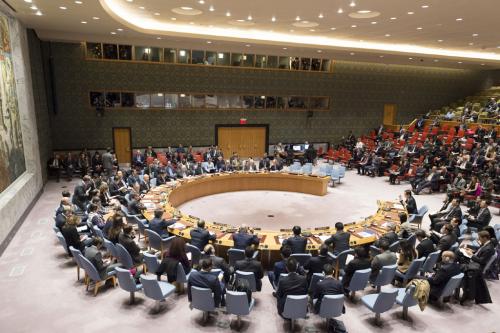After DPRK missile launch, UN political chief urges Security Council to ‘do all it can’ to prevent escalation
Following the latest ballistic missile launch by the Democratic People’s Republic of Korea (DPRK), which its official media claimed is “capable of striking the whole mainland of the United States,” the top United Nations political affairs official on Wednesday urged Security Council members to unite in preventing an escalation.

Security Council Meeting on Non-proliferation/Democratic People’s Republic of Korea.
“Given the grave risks associated with any military confrontation, in exercise of its primary responsibility the Security Council needs to do all it can to prevent an escalation. Unity in the Security Council is critical,” said Under-Secretary-General for Political Affairs Jeffrey Feltman in an emergency meeting – the 13th time the Council has met to discuss the DPRK in 2017.
The UN political chief’s appeal came after Secretary-General António Guterres had earlier “strongly condemned” the ballistic missile launch, which, according to news reports, landed in the Sea of Japan.
A statement issued Tuesday night by Mr. Guterres' spokesman said: “This is a clear violation Security Council resolutions and shows complete disregard for the united view of the international community.”
“The Secretary-General urges the DPRK to desist from taking any further destabilizing steps. [He] reaffirms his commitment to working with all parties to reduce tensions,” the statement concluded.
In his briefing to the Council Wednesday evening, Mr. Feltman said that, according to the DPRK’s official news agency and various governmental sources, the north Asian country launched a ballistic missile, which it termed an “intercontinental ballistic rocket Hwasong-15.”
The missile was reportedly launched from an area north of the capital, Pyongyang, covering about 950 kilometres (km) and reaching an apogee of around 4,500 km, before impacting into the sea in Japan’s exclusive economic zone, he said.
These parameters indicate that, if flown on a standard trajectory, the missile as configured would have a range in excess of 13,000 km.
This is the DPRK’s third test of a ballistic missile of apparent intercontinental range in less than six months and its 20th ballistic missile launch this year.
The official media claimed the DPRK was now “capable of striking the whole mainland of the US” and that the DPRK had “finally realized the great historic cause of completing the state nuclear force, the cause of building a rocket power.”
The DPRK’s repeated nuclear and missile tests over the past two years have created great tension on the Korean Peninsula and beyond, Mr. Feltman said, stressing that this dynamic must be reversed and the solution can only be political.
Security Council unity would create an opportunity for sustained diplomatic engagement – an opportunity that must be seized in these dangerous times to seek off-ramps and work to create conditions for negotiations, he added.
This morning, Mr. Feltman called a meeting with the DPRK Permanent Representative to the UN to deliver the UN Secretary-General’s message. During the meeting, Mr. Feltman stressed that “there is nothing more dangerous to peace and security in the world than what is happening now on the Korean Peninsula.”
Turning to the humanitarian situation in the DPRK, Mr. Feltman said that the needs are increasing and food security remains a critical concern for 70 per cent of the population. Member States are again reminded of the need to support the life-saving activities carried out by humanitarian organizations in the country.
Briefing by Chair of Security Council Sanctions Committee on DPRK
Also briefing the Council was Sebastiano Cardi of Italy, the Chair of the 1718 DPRK Sanctions Committee, which facilitates implementation of the provisions of all relevant resolutions – from 1718 (2006) to the latest 2375 (2017). He said that following the adoption of resolution 2375 on 11 September this year, which significantly expanded the scope of the sanctions regime, the Committee has been engaged in facilitating implementation of all sanctions measures and is continuing its efforts in this regard.
As of on Nov 29, the Committee has received 102 national implementation reports on resolution 2270 (2016), 89 on resolution 2321 (2016) and 31 on resolution 2371 (2017). These submission rates are much higher than under previous resolutions regarding the DPRK, he said.
However, he recalled that resolution 2375 (2017) requires all Member States to submit their national implementation reports within 90 days of its adoption, that is by 12 December 2017.
Source:United Nations
- 217 reads
Human Rights
Ringing FOWPAL’s Peace Bell for the World:Nobel Peace Prize Laureates’ Visions and Actions

Protecting the World’s Cultural Diversity for a Sustainable Future

The Peace Bell Resonates at the 27th Eurasian Economic Summit

Declaration of World Day of the Power of Hope Endorsed by People in 158 Nations

Puppet Show I International Friendship Day 2020

